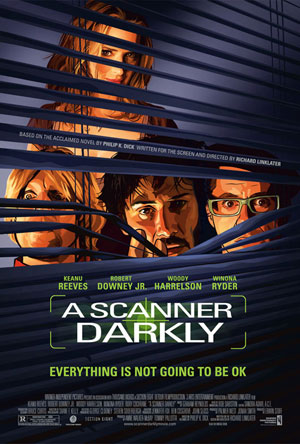 Keanu Reeves is the star of A Scanner Darkly, but the movie is really all about Robert Downey Jr, who gives what would be for any other actor the performance of a lifetime. For Downey it’s more like a little better than usual; the guy is easily one of the great living actors, and the shame is that his substance abuse issues have kept him from showing that to more people.
Keanu Reeves is the star of A Scanner Darkly, but the movie is really all about Robert Downey Jr, who gives what would be for any other actor the performance of a lifetime. For Downey it’s more like a little better than usual; the guy is easily one of the great living actors, and the shame is that his substance abuse issues have kept him from showing that to more people.
Substance abuse is what A Scanner Darkly is all about. Based on the Philip K Dick novel, Richard Linklater’s rotoscoped cartoon is a twisty examination of addiction, identity and trust. Downey plays one of the dopefiend friends Keanu Reeves is living with – and informing on.
Downey uses an almost aggressive sarcasm, so keep that in mind when reading this. As he says in the interview, he tends to think he’s smarter than everyone in the room, and at the roundtable interview he was probably right. It was interesting to watch him, because I think in many ways he was playing a game, keeping himself interested in being there in the first place.
Q: I’m sort of surprised that this is the first time you worked with Richard.
Downey: I saw School of Rock and I was like, ‘Why haven’t I worked with Richard Linklater already?’ By the time I got him I said I was really pissed off and he owed me some retroactive swag, so he gave me the ten year anniversary Dazed and Confused t-shirt I still wear with relish.
I just got a call and I read the script and I thought, ‘This is nuts. I bet this will be cool.’ And Keanu was playing the lead. So I went to the Chateau and we started to have this spitball session, we talked about the characters and all that.
Q: Was it the kind of script that you would have wanted to do if it hadn’t been Linklater directing?
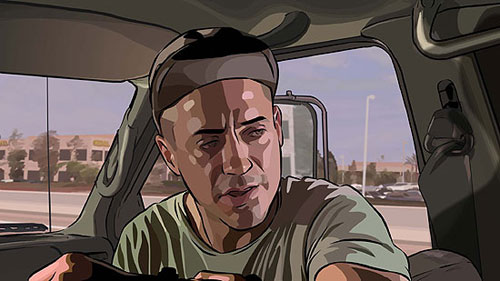
Downey: Ehhh… it would have had to have been someone real special. I am convinced that he is one of our great American directors.
Q: Was there a rehearsal process?
Downey: Oh yeah. A room a lot like this but a lot muggier and with bats around, because we were in Austin. Some gal would come in and she would like have a zit on her cheek or something and I would be like, ‘Nice bugbite!’ And then the next day I would be calling Arctor or Freck a bugbite.
The great thing about [Linklater] is that he’s real specific. He calls shooting ‘The Ground War.’ It’s this very incremental move towards the finished product. He works you like a rib, but he’s so collaborative.
Q: So the script would change during the rehearsal process?
Downey: That was just the beginning. We would talk on subjects and he would say, ‘What would some tweaked out propeller head say?’ And I would say, ‘Well… Let me think…’ [laughs]
Q: What kinds of subjects?
Downey: I would say like, ‘You have to give credit to any institution that’s so evil that they’re completely running the program.’ I’m not a big Illuminati guy. I think paranoia goes from generation to generation and it’s convenient, if you’re neurotic, to imagine there are these people controlling everything – that way it’s manageable, and small. Like fucking Wizard of Oz, to tell you the truth. But that’s not life. Life is messy.
Q: Does knowing that your performance is going to animated later affect your choices?
Downey: I kind of forgot, to tell you the truth. I forgot and then I was really pleased. There’s the greatest smoke ring blown in the history of cinema, and that’s no small feat.
Q: Did you look at the live footage?
Downey: Yeah. It looked really simple. And crude. And improperly lit, which it was. But it also would have suffice. This rotoscoping or whatever, the long way of saying ‘trippy,’ was a good fit for telling the story, I think.
Q: Did you give any thought beforehand to your character’s logic processes?
Downey: If you’re anything like me there are days where you’re pretty convinced you know more than everyone around you anyway – which is often confirmed by your interactions with people. I just know that if you talk faster and use more ten dollar words than everyone, you can convince half of them that they should shut up, because you know what you’re talking about. The great thing is that it’s hardwired into the script, where he says ‘I’ve got to figure it out, I installed the cameras, and I did..’ and of course he didn’t turn it on. ‘I invented a better silencer out of 23 cents of Reynolds Wrap,’ and it doesn’t work.
I think Dick was really fantastic at throwing up a stereotype or an archetype and showing you why it’s full of holes.
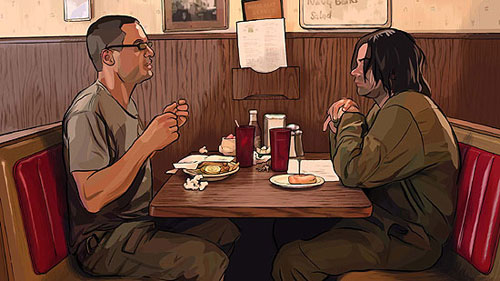
Q: Have you read any Dick?
Downey: No.
Q: Are you going to?
Downey: Yeah, OK. [laughs] I’m reading Confessions of a Corporate Hitman. I saw it at a second hand bookstore and I was like, ‘Wow, this was written in 2004. I’m almost up to date with what’s going on in the literary world now.’
Q: You guys probably didn’t have to spend much time in hair and makeup for this film.
Downey: I gave myself a really bad haircut a week before we started and the missus was like, ‘What the fuck?’ I was like, ‘Do you like it?’ and she said, ‘You cut your hair yourself. You look crazy.’ And then it started growing out and thought I should trim it and [Linklater] was like, ‘Don’t worry about it.’ Body mics would fall out, things would fall into the frame – the continuity is up to the artists.
Q: The scene where you get the bicycle – was that in the script or was it you?
Downey: I just kept looking at it like, follow the logic of the scene with the logic of someone who is obviously wrong but who is very excited. And then his life crashes before his eyes and he pulls everyone else in. I said [to Winona] ‘Yeah, this is a BOY’S bike.’ He just condescends to people. I followed the string of the scene and improvise on that and lock into it.
Q: I recently saw The Outsider, the documentary about James Toback. The film goes into your friendship with him a bit. You’ve worked with so many great directors – what is it that you’re looking for in a director? Is it a friendship like with Toback?
Downey: It’s always the same thing. I want to find a man or a woman where we become a third thing together, and that third thing is the character. That’s it. I’m not interested in arguing. I’m not interested in imagining that the status is any different than it has ever been – it’s a director’s medium and you’re there to serve the piece. If the piece happens to be the character and what’s happening and what the character means then you’re always playing the director in a way. If there’s a director who’s confident enough in herself or himself to realize that’s the alchemy that can happen, then it’s a fucking love affair.
Q: How is that with someone like David Fincher, who I understand is tough on actors?
Downey: He’s very tough on technique. If you’re a technically proficient actor, you’re going to survive. If you’re not, you’re going to hate him.
I love him!
Q: How about a movie like Shaggy Dog? Was that just a case of taking a movie for a paycheck?
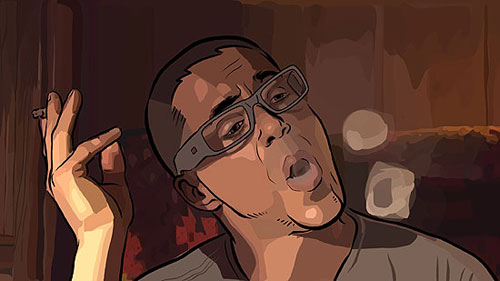
Downey: I wanted to be in a Disney movie and they offered it. Best job I ever had. The craft service is amazing. It’s fucking crazy. ‘Hey thanks, we got that shot with the monkeys, we’ll see you in three weeks. Did you get your check?’
Q: Does it strike you that now is a particularly good time for this movie to come around?
Downey: Movies are a mystery to me because they’re alive. The experience of making them and the process are… we’re left with these articles and the stuff that will come out and I’ll be left with what it was like in the room and what kind of day it was – it was raining and now it’s not – and that’s what I think is so magical. Every frame of the film is supported by the – and I’m not crazy about this word – the karma of the people who did it. It’s one thing to have that Bodhi Tree bullshit attitude and it’s another to come to realize that it’s largely true.
So yeah, this film ten years ago would have meant another thing; twenty years ago, if it had been made into a film right when it had been written would have… It’s just seeing those cycles. I’ve been around enough cycles to know that I’m playing the school principal instead of the rebel student, and things tend to repeat themselves in a way that’s predictable and yet exciting.
Q: Does a film’s theatrical performance affect that karma in the frame? Kiss Kiss Bang Bang was one of my favorite movies of last year, but no one saw it – does that affect the way you look at the film?
Downey: [squeaky voice] No, I’m fine. [laughs] Look – disappointment, humility, it’s all part of the thing. I look for the highest degree of difficulty and disappointment; it just becomes better quality. Like I said, life’s really messy. But again, either the cosmos has order to it or it doesn’t, and I choose to believe it does. So to judge or to compare is a really dangerous pastime.
I think I hold the record for being the actor who has done the most movies and still be getting paid the same amount I was three movies in. ‘How much is so and so making?’ ‘He’s making four million dollars.’ ‘What’s his name again?’ ‘Well, he was in this movie and it wasn’t a hit, but boy is he hot.’ ‘Wow. How the fuck did he do that?’ It’s my lot in life to be patient and wait and be disappointed because it’s not about your day job anyway. It’s about what you’re here to do. Whatever that is.
Q: When you saw Scanner was there a scene that you thought worked really well when animated?
Downey: I don’t want to hit on the bike scene too much, but the entirety of the cast falls to smithereens there. One person introducing an item of novelty. But there are all these scenes, when it’s starting to escalate and you don’t know who can trust who. I read the script, but I try to look at these things through the eyes of a child when possible and I had this emotional moment when I saw it in Cannes because I realized it’s Dick’s story and it’s personal and it’s nowadays and it’s science fiction and it’s about this generation of actors who – well, except maybe for Keanu – hasn’t gotten through the last ten years in one piece. And that’s fine!
Q: In a lot of ways the script is more character based than plot based. Is that part of what attracted you?
Downey: Yeah. In Kiss Kiss Bang Bang the story was the plot and then the characters played a little bit around within that and to me it was this glorious outcome. Scanner Darkly has themes and layers, but in the end who cares what’s happening. That’s why Linklater is such an American treasure – directing is a really tall order, and understanding how you dial it in so whatever that wave form is hits all those points, and isn’t just technical or isn’t just emotional.
I’d much rather have something be technical than emotional, which is a little bit odd to say as an actor. I’ve just seen so many people who turn it up to 11 – ‘Oh FUUUUUUUUUUU-UUUUUUUUUCK!’ Like, wow, that was the big FUUUUUU-UUUUUUUCK scene.
Q: Did the actors all understand the story and characters?
Downey: I would say that Rick and Keanu got it. Winona looked great and is a great actress and is really smart. And Woody and I were basically in a scenery chewing competition. At one point I shoot off this silencer and I hear thud. I go, did he just fall out of the tree without a crash pad underneath him? What is he trying to do – this is my scene! I look over and he’s like, ‘That’s lunch!’
Q: It sounds like you really enjoyed making this movie –
Downey: Yeah, I did.
Q: Was it the combination of talents?
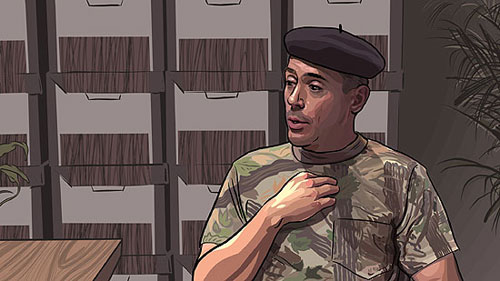
Downey: Again, I’ll go back to it was a period in time. It was in Austin, we were all staying at this Hilton hotel. Woody wouldn’t put on his air conditioning. Keanu had his bass in the next room. Winona was like, ‘You guys want to go to a movie?’ I was like, ‘No, I want to make a fucking movie! I’m studying!’ ‘Alright, you’re kind of serious about this light hearted part you’re doing.’ I was like, ‘Shut up! You study your fucking lines too!’ I was so uptight. Because it was hard!
I went to work and when I wasn’t shooting on the set I was studying, I went to the gym and studied at the gym and then I went and ate at the same restaurant every night. I went in like it was fucking boot camp.
Q: What’s next? Zodiac is finished, right?
Downey: Zodiac’s done, Fur’s coming out. I’m doing this movie in Toronto called Charlie Bartlett which I adore. John Poll, who is Jay Roach’s editor and producing partner, is directing it. It’s fantastic, like if Mean Girls was Harold and Maude. And I play a school principal.
Q: Did Guide to Recognizing Your Saints get picked up from Sundance?
Downey: Yeah, it’s coming out in September. Produced it!
Q: Are you going to do more producing?
Downey: God I hate that job. Yes.
Q: Is there any truth to the rumor that you’re playing Edgar Allan Poe in Stallone’s movie?
Downey: Listen, you fucking IMDB motherfucker… I have to start having some fun. I have to put in ‘Robert Downey Jr replaces Tobey Maguire for the last three days of Spider-Man 3.’
No, I’m sorry. I apologize if I was a bit rough on you. I do admit I had dinner with Sly; not ashamed of it, it was a blast. He wrote a great script. He said I should wait until I’m hot again. ‘We should wait until you’re hot again so we can do this at a big studio. I don’t want to do this cheap.’
Q: Stallone said that?
Downey: Yeah.
Q: Stallone said he wanted to wait until YOU were hot again?
Downey: [laughs] Well maybe he meant we. He’s a great guy. Really smart. Flava Flav came over to the table. ‘Are you and Flava Flav playing Poe?’ Yes we are. It’s just too tough a role; it needs two actors.
Q: Does this film have relevance to the future?
Downey: I bet it does. I’ve just decided to put myself under the impression that everything is so layered and things are so binary – 1 and 0 adds up to all these things and next thing you know, you’ve got a fucking screensaver. To break things down into ‘Is this good, is this bad, is this going to be hard, is this going to be worth it, is it going to be scary or is there going to be cataclysm,’ it’s like, what do you fucking think? Things change. A lot. And I think this is an exciting time. I think so. I think it’s an exciting time for film, which is sometimes an indication of where society’s at.